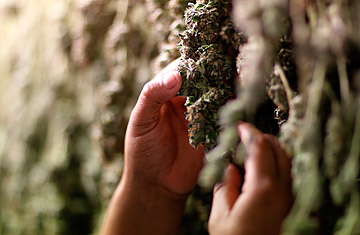
In 1996, California became the first U.S. state to legalize medical marijuana. Since then, 13 other states and the District of Columbia have done the same
(2 of 2)
Supporters of Prop 19 argue that in these dire fiscal times, when the state has been laying off teachers and hospitals have been firing nurses, putting low-level pot users through the legal system is a luxury California cannot afford. Governor Schwarzenegger — who opposes Prop 19, which he believes goes too far — said when he signed the pot-infraction law that bringing criminal charges for pot possession is a waste of "limited resources" in a time when the state faces "drastic budget cuts." The governor may also have been thinking about conditions in his state's prisons, which house twice as many inmates as they were designed to hold, and were ordered last year to reduce the overcrowding.
Prop 19 is also getting strong backing from civil rights groups, including the state National Association for the Advancement of Colored People and the Latino Voters League. Fueling their support is a study by the Drug Policy Alliance that found that in the state's 25 largest counties, blacks were arrested at double, triple and even quadruple the rate of whites — even though studies have shown that young blacks use marijuana at lower rates than young whites.
But the biggest factor driving the pro-legalization movement is simply changing attitudes. People today are more skeptical of the claim that pot is a gateway drug and that people who use it are destined to move on to harder substances. In fact, a study published last month in the Journal of Health and Social Behavior found that life factors like employment status and stress were stronger predictors of whether teenagers would use other illegal drugs than whether they had smoked marijuana.
Many supporters of legalization acknowledge that marijuana has bad health effects. They just argue that it is hypocritical to make pot use a crime, when alcohol — which has well-documented links to automobile fatalities, domestic abuse and birth defects — remains legal. The alcohol industry has been contributing to the "Say No on Prop 19" campaign, no doubt worried that if pot is legalized, it will cut into beer and liquor sales.
If Prop 19 passes, marijuana will not be entirely legal in California. It would still violate federal law and the federal Drug Enforcement Administration could still arrest and prosecute people. But as a practical matter, the overwhelming majority of marijuana arrests are done by state law enforcement, and it seems unlikely the Federal Government would take up the slack. Last year, in fact, the Justice Department announced that it would not prosecute people who use medical marijuana in states that have made it legal.
The best indicator of where marijuana policy is headed may be the demographic breakdown of the Prop 19 polling. In a SurveyUSA poll, only 36% of likely California voters over the age of 65 said they were certain to vote yes, while 61% of those between 18 and 34 were certain they would. That is similar to the gap that polls have found for gay marriage — another social issue on which public opinion and national policy have been changing fast. When polls show a dramatic gap between the generations, as they do on marijuana legalization, it is a good bet that before long, the young people's position will prevail.
Cohen, a lawyer, is a former TIME writer and a former member of the New York Times editorial board. Case Study, his legal column for TIME.com, appears every Wednesday.
